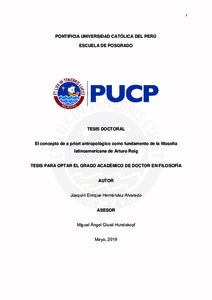| dc.contributor.advisor | Giusti Hundskopf, Miguel Ángel | |
| dc.contributor.author | Hernández Alvarado, Joaquín Enrique | |
| dc.date.accessioned | 2019-06-14T14:18:24Z | |
| dc.date.available | 2019-06-14T14:18:24Z | |
| dc.date.created | 2019 | |
| dc.date.issued | 2019-06-14 | |
| dc.identifier.uri | http://hdl.handle.net/20.500.12404/14392 | |
| dc.description.abstract | La tesis analiza críticamente el pensamiento filosófico de Arturo Andrés Roig (Mendoza,
1922-2012), para lo cual sigue el proceso de constitución del concepto de a priori
antropológico y las implicaciones que este tiene en su propuesta teórica. Roig desarrolla una
filosofía latinoamericana con las características de la filosofía moderna: criticidad,
racionalidad, normatividad. Frente al debate existente en las décadas de los años 60 y 70 del
siglo XX en torno de la existencia de una filosofía americana, Roig postula la construcción de
una teoría del pensamiento latinoamericano. Siguiendo a Hegel (Lecciones de la filosofía de
la historia), Roig considera que la filosofía tiene un comienzo, no de hecho sino de derecho,
que radica en el a priori antropológico, en la posibilidad que tiene todo hombre de volverse
sujeto consciente del valor que sí mismo y de la dignidad de pensarse como tal. Para formular
el concepto de a priori antropológico, Roig emprende un diálogo y debate con la filosofía
moderna occidental, especialmente con Kant y Hegel, que a su juicio ya lo formularon, pero
de forma no aceptable para Roig, porque parten de la conciencia y no de la realidad o
empiricidad, es decir el mundo independiente de la conciencia. El a priori antropológico es el
fundamento de la historia de las ideas es decir del hecho histórico registrado en los términos
de esa disciplina. Por ello, la filosofía latinoamericana de Roig es una crítica de la razón
histórica que fundamenta el conocimiento del hecho histórico. En esta investigación, por
tanto, se examinan tanto la constitución del concepto de a priori antropológico en Roig como
su articulación con los de sujeto (plural, nosotros), autoconsciencia, historicidad, empiricidad,
libertad. | es_ES |
| dc.description.abstract | This thesis is a critical analysis of Arturo Andres Roig’s (Mendoza, 1922-2012),
philosophical thinking; the process of constituting the concept of anthropological a priori is
followed for this purpose, as are also the implications that it has in its theoretical proposal.
Roig develops a Latin American philosophy that shows modern philosophy’s traits, namely:
criticality, rationality, normativity. When facing the twentieth century debate that existed in
the sixties and the seventies concerning whether an American philosophy exists, Roig
postulates the construction of a theory of Latin American thinking. Following Hegel (Lessons
of the Philosophy of History), Roig considers that Philosophy does not have a beginning in
fact but in law and that it is rooted on anthropological a priori, on every man’s possibility of
becoming the conscious subject of his own value and of the dignity of thinking of himself as
such. In order to formulate the concept of anthropological a priori, Roig starts a dialogue and
a debate with modern Western philosophy, especially with Kant´s and Hegel´s; in his
judgement, they already formulated the concept, but not in a way that is acceptable to Roig,
because both start from consciousness and not from reality or empiricity; in other words, they
start from the independent world of consciousness. Anthropological a priori is the foundation
of the history of ideas; in other words, it is the foundation of the historical fact that is
registered in terms of that discipline. For that reason, Roig’s Latin American philosophy is a
criticism of the historical reasoning on which the historical fact is based. The present research,
therefore, will examine both the constitution of the concept of Roig’s anthropological a priori
and its articulation with a plural self-conscious subject (we) with historicity, empiricity and
freedom. | es_ES |
| dc.language.iso | spa | es_ES |
| dc.publisher | Pontificia Universidad Católica del Perú | es_ES |
| dc.rights | info:eu-repo/semantics/openAccess | es_ES |
| dc.rights.uri | http://creativecommons.org/licenses/by-nc-nd/2.5/pe/ | * |
| dc.subject | Roig, Arturo Andrés--Crítica e interpretación | es_ES |
| dc.subject | Filosofía latinoamericana--Historia y crítica | es_ES |
| dc.title | El concepto de a priori antropológico como fundamento de la filosofía latinoamericana de Arturo Roig | es_ES |
| dc.type | info:eu-repo/semantics/doctoralThesis | es_ES |
| thesis.degree.name | Doctor en Filosofía | es_ES |
| thesis.degree.level | Doctorado | es_ES |
| thesis.degree.grantor | Pontificia Universidad Católica del Perú. Escuela de Posgrado | es_ES |
| thesis.degree.discipline | Filosofía | es_ES |
| renati.advisor.dni | 09344600 | |
| renati.advisor.orcid | https://orcid.org/0000-0002-9837-9981 | es_ES |
| renati.advisor.pasaporte | 1703265866 | |
| renati.discipline | 223038 | es_ES |
| renati.level | https://purl.org/pe-repo/renati/level#doctor | es_ES |
| renati.type | https://purl.org/pe-repo/renati/type#tesis | es_ES |
| dc.publisher.country | PE | |
| dc.subject.ocde | https://purl.org/pe-repo/ocde/ford#6.03.01 | es_ES |






